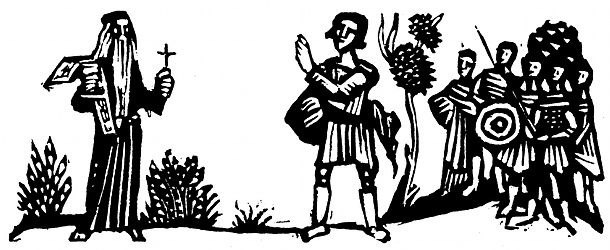Friendship with God
We know something of the Cosmic God, Ruler of the Universe. He is the creator, the all powerful: He calls to the heavens, and His voice shakes the mountains. This cosmic deity is the Christ Pantokrator painted up inside the dome in the Orthodox Church. He is a bit angry looking and--compared to the multitude of Biblical characters painted on the plaster walls--He is the furthest from the people.
But how accurate is this cultural/architectural portrayal of God? In the patriarchal societies of the Orthodox traditions, somehow the male Jesus is limited to playing the part of the stern almighty. In churches in Greece, Mary is painted over the door, as if only Jesus' mother has the feminine quality of mercy, necessary to welcome the lost sheep home again.
But this is not true to the Scriptural portrayal of God as our friend. The "cosmic God" is too easy to ignore, too far away to matter. But a God who invites Himself into our living room, shares intimate truths with us, and requires the same transparency in return ... this God is impossible to ignore.
If the God of the universe really wants to call me friend, some questions come to mind: When Jesus says, "You are my friends if you obey me", do I want this friendship or not? Does the thought of obedience make me feel more like a friend or a servant? Historically, if the Orthodox traditions are any clue, we are fixated on the 'obedience' and not on the 'friendship'. If the friendship is a reward for obedience, then I may be in trouble. But I believe the truth is subtly different: obedience is a sign of my desire to be a friend to Jesus, a result of my honest desire to be true to Him. I can show myself to be a true friend of Jesus by practicing obedience.
These questions are important to me, because it is the possibility of friendship with God that makes his cosmic stature bearable for me. I believe Jesus desires my friendship. And I want it too, so I am willing to consider obedience to God, though I may avoid it otherwise.
But how does friendship with God work? God is called many things in Scripture. For example, the Hebrew El Shaddai does mean "God Almighty". Next to this, how do we name God "friend"? The following passages help paint the picture.
Psalm 145.18: The LORD is close to all who call on him, yes, to all who call on him sincerely.
James 4.8: Draw close to God, and God will draw close to you.
Leviticus 26.12: [God says,] I will walk among you; I will be your God, and you will be my people.
Exodus 33.11-14: the LORD would speak to Moses face to face, as a man speaks to his friend. [.] Moses said to the LORD, "You have been telling me, 'Take these people up to the Promised Land.' But you haven't told me whom you will send with me. [.] And the LORD replied, "I will personally go with you, Moses. I will give you rest -- everything will be fine for you."
John 15.12, 13: [Jesus says,] I command you to love each other in the same way that I love you. And here is how to measure it -- the greatest love is shown when people lay down their lives for their friends.
John 15.15: I no longer call you servants, because a master doesn't confide in his servants. Now you are my friends, since I have told you everything the Father told me.
This God is so driven by his desire for an intimate relationship with his people that not only does he come down from his throne in the dome of the heavens to "walk among us", but as a sign that there is no limit to his love, this God of the cosmos will lay down his life for his friends.
November 1999
But how accurate is this cultural/architectural portrayal of God? In the patriarchal societies of the Orthodox traditions, somehow the male Jesus is limited to playing the part of the stern almighty. In churches in Greece, Mary is painted over the door, as if only Jesus' mother has the feminine quality of mercy, necessary to welcome the lost sheep home again.
But this is not true to the Scriptural portrayal of God as our friend. The "cosmic God" is too easy to ignore, too far away to matter. But a God who invites Himself into our living room, shares intimate truths with us, and requires the same transparency in return ... this God is impossible to ignore.
You are my friends if you obey me. I no longer call you servants, because a master doesn't confide in his servants. Now you are my friends, since I have told you everything the Father told me. (John 15.14,15 )
If the God of the universe really wants to call me friend, some questions come to mind: When Jesus says, "You are my friends if you obey me", do I want this friendship or not? Does the thought of obedience make me feel more like a friend or a servant? Historically, if the Orthodox traditions are any clue, we are fixated on the 'obedience' and not on the 'friendship'. If the friendship is a reward for obedience, then I may be in trouble. But I believe the truth is subtly different: obedience is a sign of my desire to be a friend to Jesus, a result of my honest desire to be true to Him. I can show myself to be a true friend of Jesus by practicing obedience.
These questions are important to me, because it is the possibility of friendship with God that makes his cosmic stature bearable for me. I believe Jesus desires my friendship. And I want it too, so I am willing to consider obedience to God, though I may avoid it otherwise.
But how does friendship with God work? God is called many things in Scripture. For example, the Hebrew El Shaddai does mean "God Almighty". Next to this, how do we name God "friend"? The following passages help paint the picture.
Psalm 145.18: The LORD is close to all who call on him, yes, to all who call on him sincerely.
James 4.8: Draw close to God, and God will draw close to you.
Leviticus 26.12: [God says,] I will walk among you; I will be your God, and you will be my people.
Exodus 33.11-14: the LORD would speak to Moses face to face, as a man speaks to his friend. [.] Moses said to the LORD, "You have been telling me, 'Take these people up to the Promised Land.' But you haven't told me whom you will send with me. [.] And the LORD replied, "I will personally go with you, Moses. I will give you rest -- everything will be fine for you."
John 15.12, 13: [Jesus says,] I command you to love each other in the same way that I love you. And here is how to measure it -- the greatest love is shown when people lay down their lives for their friends.
John 15.15: I no longer call you servants, because a master doesn't confide in his servants. Now you are my friends, since I have told you everything the Father told me.
This God is so driven by his desire for an intimate relationship with his people that not only does he come down from his throne in the dome of the heavens to "walk among us", but as a sign that there is no limit to his love, this God of the cosmos will lay down his life for his friends.
November 1999



0 Comments:
Post a Comment
<< Home